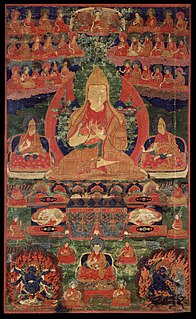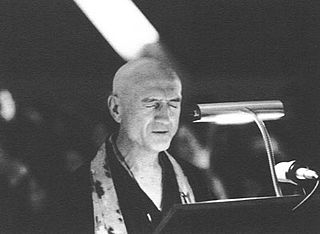A Quote by Gautama Buddha
For fear of causing terror to living beings, Mahamati, let the Bodhisattva who is disciplining himself to attain compassion, refrain from eating flesh.
Related Quotes
To avoid causing terror to living beings, let the disciple refrain from eating meat... the food of the wise is that which is consumed by the sadhus [holymen]; it does not consist of meat... There may be some foolish people in the future who will say that I permitted meat-eating and that I partook of meat myself, but... meat-eating I have not permitted to anyone, I do not permit, I will not permit meat-eating in any form, in any manner and in any place; it is unconditionally prohibited for all.
A virtuous man or woman who is determined to develop the Supreme Enlightened Mind, should thus develop it: I have to lead all living beings to put a stop to (reincarnation) and escape (suffering), and when they have been so led, not one of them in fact stops (reincarnating) or escapes suffering. Why? Because, if a Bodhisattva believes in the notion of an ego, a personality, or a living being, he is not a true Bodhisattva.
Flesh eating is simply immoral, as it involves the performance of an act which is contrary to moral feeling: By killing, man suppresses in himself, unnecessarily, the highest spiritual capacity, that of sympathy and pity towards living creatures like himself and by violating his own feelings becomes cruel." "As long as there are slaughterhouses, there will be battlefields.
We have compassion because of the incredible pain and suffering which we as unenlightened beings cause to ourselves and all others through our ignorance. This is why we're trying to get out. This is why the bodhisattva has meaning. Because we're saying, no we won't get out, we won't escape until we've helped all other beings to escape, but most other beings don't even want to escape. They don't even know that there is an escape, and it's hard, so it's going to take an awfully long time.
When we want a cup of tea our main wish is to drink tea, but to fulfill this wish we naturally develop the secondary wish to find a cup. In a similar way, the main wish of those who have great compassion is to protect all living beings from their suffering, but to fulfill this wish they know they must first attain Buddhahood themselves and so they naturally develop the secondary wish to attain enlightenment.
As humans, we do get to choose what we eat, and when we choose to eat a plant, we are eating (i.e., harming) just that plant, plus indirectly whatever nutrients that plant consumed over its lifetime (and we are also harming whatever beings may have been living on that plant or who were injured or killed in the harvesting process). But when we eat an animal, we are eating not just that animal, but also indirectly all of the plants and other beings that that animal ate over its lifetime - those plants became the flesh that we eat.
Living apart and at peace with myself,I came to realize more vividly the meaning of the doctrine of acceptance. To refrain from giving advice, to refrain from meddling in the affairs of others, to refrain even though the motives be the highest, from tampering with anothers way of life-so simple, yet so difficult for an active spirit. Hands Off.
Ultimately the case for shunning animal flesh does not rest on what the Buddha allegedly said or didn't say. What is does rest on is our innate moral goodness, compassion, and pity which, when liberated, lead us to value all forms of life. It is obvious, then, that willfully to take life, or through the eating of meat indirectly to cause others to kill, runs counter to the deepest instincts of human beings.



























